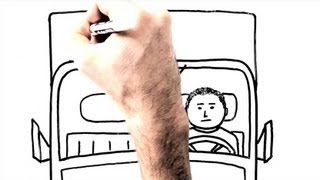(单词翻译:单击)
Everything is everywhere these days.
现如今,每样东西都无所不在。
Check out the supermarket -- orange juice from China, nuts from India, swordfish from Japan, lagers from Czechoslovakia, scores of European cheeses.
去超市看看--中国来的柳橙汁,印度来的坚果,日本来的剑鱼,捷克来的拉格啤酒,成堆的欧洲吉士。
You name it, it's there. Not when I was growing up. You'd never taste a range of French cheeses or Bohemian lager beer.
随你选,什么都有。我成长的年代可不是如此。你从没尝过什么法国吉士或波希米亚拉格啤酒。
At least, you couldn't unless you were very rich and could go anywhere when the fancy took you.
至少,你做不到,除非你很有钱,可以去任何你想去的地方。
All that has changed. But it's not just foods. Got an iPhone?
今非昔比,但不只是食物。你有iPhone吗?
Everyone knows it was invented and designed at Cupertino in California,
大家都知道它在加州的库比蒂诺被发明设计出来,
but who knows where the complex bits and pieces of its innards are made or assembled?
但谁知道那里面复杂的零零碎碎是在哪里制造或装配的?
Apple doesn't say. The industry credits China, Japan, Germany, South Korea and, of course, the United States itself.
苹果公司没说,但业界说是中国、日本、德国、韩国,当然还有美国本身。
Just think for a moment of the trillions of parts and finished goods moving cheaply around the world every second, a small portion by air, but most by sea.
想一下每一秒有多少零件及成品廉价地在世界各地通行,一小部份由空运,但大部分是经由海运。
We call it globalization, but the man who basically made globalization a reality in our lives is too little known.
我们称之为全球化,但那位基本上将全球化实践于我们生活的人实在太不为人知了。
This is his story. The story of the man who makes your day.
而这就是他的故事,一个让你的日子更美好的人的故事。
In the Great Depression of the '30s, when millions of Americans were out of work, worse than now, Malcolm McLean was a 24-year-old truck driver.
在30年代经济大萧条期间,无数美国人没有工作,比现在还惨,马尔科姆·麦克林是个24岁的卡车司机。
He got a job to take cotton bales from Fayetteville in North Carolina all the way to a pier in Hoboken, New Jersey for shipping overseas.
他找到一个工作,把一捆捆的棉花从北卡罗莱纳州的费耶特维尔直送到新泽西州霍博肯的一个码头出口。
He was glad of the work, but when he arrived he got bored out of his mind, sitting in his truck waiting and waiting and waiting on the docks
他很感激有这份工作,但当他抵达时他百般无聊,坐在他的卡车上,在码头边等啊等啊等啊,
as the worker ants muscled crates and bundles off other trucks and into slings that lifted the goods into the hold of the ship.
等着工蚁举起膀臂,把箱子捆包搬下车放上吊索,再把货品吊到船舱。
On board the ship itself, with much yelling and arm waving,
在船上,码头工人大声喊叫,挥舞着手臂,
the stevedores then unloaded each sling and saw its contents placed in a designated position in the hold.
从吊索上卸下货物,并看着它放到指定位置进船舱。

Malcolm wasn't just bored, he was fuming.
马尔科姆岂止无聊,他气得七窍生烟。
His income depended on getting back to North Carolina to pick up more loads in his truck. Out of the frustration, inspiration struck.
他的收入全靠他赶回北卡、搬更多的货到他的卡车上。在挫折中,灵感来袭。
Wouldn't it be great, he thought, if my trailer could be lifted and placed on the ship without its cotton bales being touched.
这岂不更好,他这么想,如果我的拖车能直接被吊起放到船上,而不用搬出里面的棉花捆。
Yes, it would be great. It would be revolutionary.
没错,这样非常好。这是个革新的想法。
For centuries, general non-bulk cargo had been shipped in the process he watched.
几个世纪以来,一般散装船都以他所看到的方式装运。
It was called break bulk shipping. Boxes, bales, crates handled piece by piece.
这称为散装货物船运。箱子、捆包、板条箱都是一件一件搬。
What Malcolm envisaged would have saved him only a day,
马尔科姆设想到的情况或许只能省他一天的工,
but it would have saved everyone else something like two weeks in loading and unloading the ship.
但却可能省其他人在船上上货卸货大约二个星期的时间。
On average, it was eight days to haul and distribute break bulk shipments in the hold,
一般来说,要花八天来装船舱中的散装物,
plus another eight days at the other end to retrieve and distribute.
抵达后还要再加上八天来卸货、发货。
All that time would have been saved if Malcolm McLean could have just driven his truck onto the ship and at the other end, driven it off.
如果马尔科姆只把卡车开上船,抵达目的地后再直接开下来,这些时间就都可以省下。
Well, today that concept is a reality. The concept that occurred to Malcolm is known as containerization.
嗯,今天这项概念已经实现。马尔科姆突发奇想的这个概念被称为集装箱化。
It has done more than just save a great deal of time. It's the reason why we have a thriving global marketplace,
这不仅节省很多时间,这也是为什么我们能有如此繁荣的全球市场的原因。
offering us that infinite variety of things, and it's the reason we can move cargo from remote parts of the world at minimal cost.
提供我们无限多种类的物品,这也是我们能以最低成本从世界的偏远地区运输货物的原因。
Malcolm had his idea in 1937. The 24-year-old truck driver sitting in his truck in Hoboken was 40 before he did anything about it.
马尔科姆在1937年有了这个想法。不过这位当时24岁、在霍博肯坐在卡车上的卡车司机,直到40岁才开始付诸行动。
By then, he'd built his one truck into a big trucking company.
那时,他已从一辆卡车发展到大型运输公司。
He borrowed money from an enterprising vice president at Citibank in New York,
他从纽约花旗银行一位有魄力的副总裁手中借到钱,
and set about designing the steel boxes and the decks of the ships to carry them stacked one on top of another.
并着手设计钢箱,以及能把箱子一个一个叠起来运输的货船甲板。
A lot of people thought he was crazy. Inventors always attract armies of naysayers who can never remember how critical they were.
很多人认为他疯了。发明家总是引来众多反对者,这些反对者从不记得他们有多么吹毛求疵。
For our part, we should remember Malcolm McLean.
而我们呢,我们应该要记住马尔科姆。
His first container ship, the Ideal X, sailed from Shed 154 at Marsh Street, Port Newark with 58 well-filled boxes.
他的第一艘集装箱运货船,理想X号,从位于纽瓦克港马什街的154号周转仓库出航,装了58个满满的集装箱。
It was the beginning of the container era, shrinking our world and enlarging human choice.
这是集装箱运输时代的开始,它缩小了我们的世界,扩大了人们的选择。


